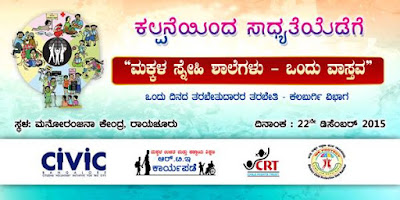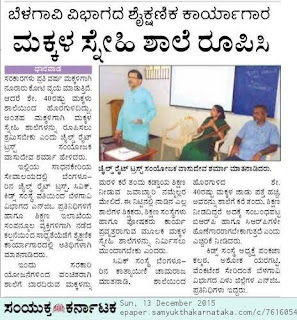Karnataka
Task Force Against Child Marriages urges His Excellency Sri Vajubhai Rudabhai
Vala, the Hon’ble Governor of Karnataka to expedite and forward the passing of
the Karnataka Government’s Amendment to the Prohibition of Child Marriage Act
2006 for assent of President of India.
The
proposed amendment provides stringent punishment to child marriage abettors
with imprisonment from one to two years and also empowers police to take suo
motu cognizance of the crime and book cases. The amendment also has proposed to
declare child marriages null and void.
The Task Force points out that any further delay in passing this very
progressive amendment will only mean that the children can continue to fall
prey to CHILD MARRIAGES.
Several surveys and statistical analysis have
shown that Karnataka is one of the states where marriages of girls below 18 and
boys below 21 are happening in large scale. These reports actually question the
state Govt’s claim that child marriages have reduced! Child Marriages have become a common feature
in parts of the state while religious, political and societal patronage is
given both discreetly and in public. The
Prohibition of Child Marriages Act 2006 has clearly mentions that any
individual or organizations abetting child marriages would be punished with
imprisonment up to 2 years and fine up to Rs.1 lakh. But, in the last ten
years very few cases have been filed against the abettors as there is very
little or no knowledge about the provisions of the Act, that protects the
interests of CHILDREN.
One big reason for abettors of child marriages
to get away is the lack of actual birth date records that show up the real age
of the girls. The Karnataka State TaskForce Against Child Marriages urges the
Auxiliary Nurse-Midwives (ANM), Angan Wadi Workers (AWW) as well school
teachers in all habitations to adhere to the strict norms of noting the real
age of every pregnant or expectant mothers. We also request the
ANMs, AWWs, ASHA and the School Teachers not to support any child marriages or
keep quite when they get to know about possible incidents of child
marriages
Prevalence of child marriages has been
established as a reason for not meeting several development indicators as shown
in the MDGs (Millennium Development Goals) and the Sustainable Development
Goals (SDG). The cycle of higher Infant Mortality Rate (IMR), Under 5 Mortality
Rate (U5MR) and Maternal Mortality Rate (MMR) and malnutrition among children,
etc., are directly linked to child marriages. If we don’t arrest child
marriages today meeting development goals would be just a slogan in India.
n the state there are thousand Child Marriage
Prohibition Officers (CMPO). We urge these CMPOs who are present from village
level to state level to act today to protect the rights of the children. In the
last six months, the TaskForce which is formed with six active NGOs working in
the districts of Bengaluru, Chikkaballapura and Chamarajanagara have prevented 60
child marriages and have brought the cases to the notice of the Govt machinery
and police. Also 6 FIRs have been filed against the abettors of child
marriages. But, more than 6
marriages are conducted later discreetly.
The Task Force expresses its anguish about the
inaction by the police at village level, who do not come forth to protect the
interests of the children facing marriage and file FIRs against the abettors.
The Task Force urges the Governor to sign the proposed amendment, which gives
suo motu powers to the police to take action against any abettors of child
marriages. This would also empower the Special Juvenile Police Unit officers,
who are designated under the JJ Act to take action, considering a victim of
child marriage as a ‘child in need of care and protection’ as defined in Sec. 2
The Task Force urges
the Government to take seriously the recommendations made by the Justice
Shivaraj Patil Committee in arresting child marriages. The Task Force also urges the judiciary to take
swift note of appeals for issuing INJUNCTION order to prevent child marriages.
In the villages and towns marriages are by and
large conducted by families without any prior permission or withoiut getting
'no objection' certificate from a Govt. Authority. We urge the Government to
consider bringing a general rule that when a marriage is planned, the
family has to apply to the PDO in the Village Panchayat or Town Panchayat by
giving age proof of the bride/ groom and get a no objection certificate.
Chowltry/Kalyan mantapa owners or Temple
Trustee or Priest should not allow the marriage to be conducted if 'no
objection certificate' is not submitted.
Once every
month or once in every three months, temple (Devasthanam) Priest or Trustee,
Owners of Kalyana Mantapas should submit to the Taluk Marriage Registrar or
Thasildar / or to a Panchayat Executive, a report furnishing details of the
marriages conducted. (Already there is a law that all marriages should be
registered with the Government Marriage Registrars).
Consortium: Karnataka TaskForce Against Child Marriage is part of a
consortium of six NGOs coming together (MANUSH, Chikkaballaura; PMSR,
Chamrajanagara; QWARIDS, VIDYANIKETHAN, CIVIC and CRT, Bengaluru) and is taking
up a campaign against child marriages, coupled with sensitizing workshops with
Govt officials, police, NGOs and general public.
































